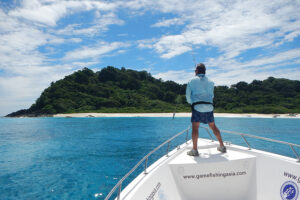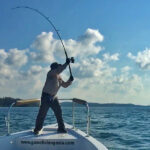
Introduction
The Andaman Islands, with their rich marine biodiversity and pristine waters, hold significant potential for sport fisheries. As coastal communities face increasing vulnerability due to high population growth rates and poverty, alternative livelihood strategies that promote sustainability are crucial. Sport fishing, particularly catch and release angling for predatory game fish, emerges as a promising avenue to generate income while conserving fish stocks and habitats.
The Promise of Sport Fisheries
Sport fishing in the Andaman Islands can provide economic benefits and contribute to conservation efforts. By attracting tourists and recreational anglers, sport fisheries can create job opportunities and stimulate local economies. Furthermore, the practice of catch and release helps ensure the sustainability of fish populations, preserving the marine ecosystem for future generations.
Key Principles for Successful Sport Fishery Enterprises
1. **Local Capacity Building**
Effective management of sport fishery enterprises requires adequate local capacity. This involves training local community members to manage tourism businesses and facilities, ensuring they possess the necessary skills and knowledge to operate successfully. Collaboration among stakeholders at various scales is essential for co-management and effective governance.
2. **Equitable Benefit Distribution**
Governance arrangements must ensure that the benefits of sport fisheries are equitably distributed among all members of the local community. Clear mechanisms for conflict resolution and benefit-sharing are crucial to maintain harmony and support from the community.
3. **Clear Resource Boundaries and Rights**
Defining resource-ownership boundaries and rights before launching a sport fishery enterprise minimizes potential conflicts. Clearly delineated boundaries help avoid disputes and ensure that the benefits of the enterprise are enjoyed by the intended beneficiaries.
4. **Social, Biodiversity, and Ecosystem Service Co-Benefits**
Sport fisheries should deliver multiple benefits, including improvements in income, health, education, and food security. Additionally, they should enhance the status of target and non-target species, their habitats, and non-fishery ecosystem services. These co-benefits contribute to the overall well-being of the community and the environment.
5. **Monitoring and Adaptive Co-Management**
Continuous monitoring and evaluation within an adaptive co-management framework are essential for the success of sport fisheries. Involving all stakeholders in social learning and power-sharing ensures that the enterprise remains flexible and responsive to changing conditions. This approach can lead to broader impacts beyond financial or biodiversity terms, fostering long-term sustainability.
Challenges and Considerations
While the potential benefits of sport fisheries are significant, several challenges must be addressed. These include ensuring adequate training and capacity building, establishing effective governance structures, and maintaining clear resource boundaries. Additionally, ongoing monitoring and adaptive management are crucial to address any emerging issues and ensure the long-term success of the enterprise.
Conclusion
Sport fisheries present a viable strategy for diversifying coastal livelihoods in the Andaman Islands. By adhering to key principles such as local capacity building, equitable benefit distribution, clear resource boundaries, and adaptive co-management, sport fisheries can provide economic opportunities while promoting conservation. Also the Andaman Islands can serve as a model for sustainable development, balancing economic growth with environmental stewardship.
—
This post highlights the potential of sport fisheries to transform coastal livelihoods in the Andaman Islands, emphasizing the importance of sustainability, community involvement, and adaptive management. By focusing on these principles, sport fishing can provide a path to economic growth while conserving the rich marine biodiversity of the region.





